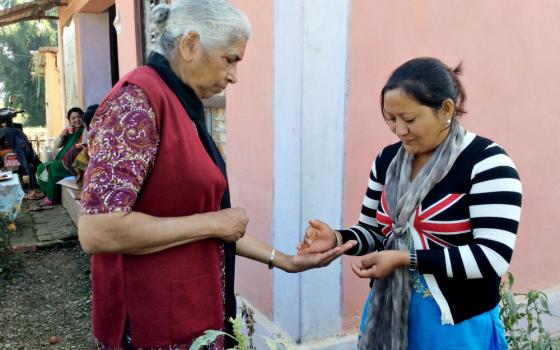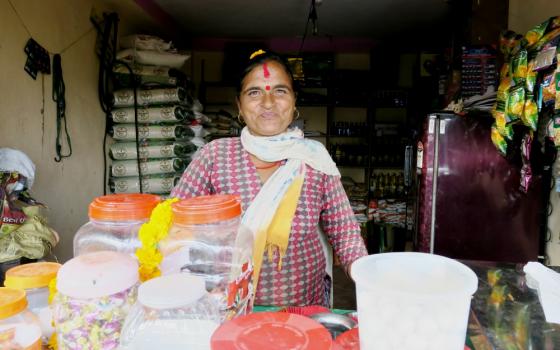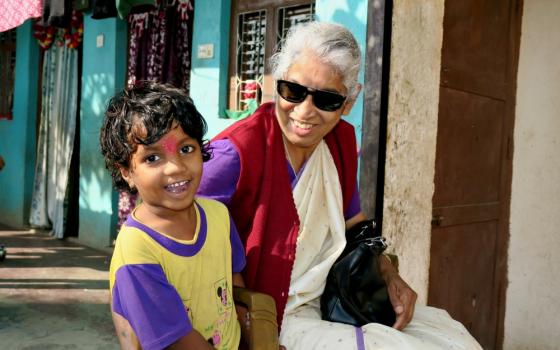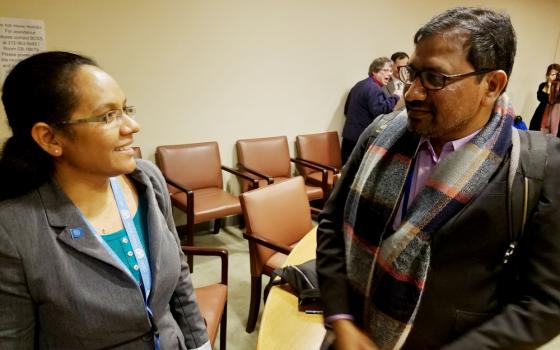Sabitri Dakhal and her husband, Nilaram Dakhal, were struggling to make ends meet, as do many residents of the west Nepal region of Surkhet. Finding it harder to eke out a living in their mountainside village, the couple migrated to a more populated valley in the area in 2005. Sabitri worked as a maid; Nilaram worked as a day laborer.
But their incomes still could not meet basic necessities, forcing Nilaram to move to neighboring India for work. With her husband away, Sabitri got to know women who belong to a self-help group based at a community cooperative founded by the Sisters of Charity of Nazareth.
Sabitri enrolled in six months of training at the cooperative, learned beekeeping "and gained self-confidence," not to mention increased income from the beekeeping and honey-making, said Sr. Teresa Kotturan, who represents the Sisters of Charity Federation at the United Nations.
Kotturan related the couple's story Jan. 30 as part of the U.N.'s recent meetings of the Commission for Social Development, the U.N. body charged with supporting and monitoring global development progress.
This year, the commission, which met Jan. 29-Feb. 7, explored the theme "Strategies for eradicating poverty to achieve sustainable development for all." The commission meetings and related events provided a forum for nongovernmental bodies like religious groups to present best practices as part of U.N.-led efforts to combat poverty through the implementation of the global body's sustainable development goals, an effort called the 2030 Agenda.
Sr. Elsa Muttathu, who represents the International Presentation Association at the U.N., described the agenda as "a pathway to the eradication of poverty, and to a life of dignity for all."
"It is a moral imperative, challenging us to recognize our common humanity, our shared responsibilities and the centrality of human dignity," she said in a statement issued to coincide with the U.N. commission meetings.
In her statement, Muttathu said the United Nations and its member states should never lose sight that those living in poverty "are cast off by society, forced to live off what is discarded, and suffer unjustly from the abuse of the environment."
The persistence of poverty, she said in her statement, "is largely the result of political choices that have consciously been made by those in power."
Muttathu said listening to the stories of those "living in multidimensional poverty attest that effective and sustainable solutions towards the eradication of poverty within communities often come from the people who live this reality."
This was underlined in the story of a best practice Kotturan related from Nepal: Taking out a loan from the cooperative allowed Sabitri to buy land, build a small house and, with another loan, open a small grocery on the first floor of the new home.
"She was successful in her venture — so much so, she was able to pay back the loan with interest in nine months," Kotturan said.
Moreover, a steady income allowed Nilaram to return from India. He, in turn, learned how to cultivate mushrooms at a government-sponsored training. Later, husband and wife each trained the other in their respective trades.
With this, the couple now earns an income of about $10,000 per year, about twice as much as the average income in Nepal.
"It's like a rags-to-riches story," Kotturan said.
Kotturan said the tale is an instructive story about what getting out of poverty actually means.
For the Dakhals, it means the couple could pay for their children's educations, including college for their daughter; provide food security — better access to food — for the family; "recognition and reward for risks taken and for the leadership in the community," Kotturan said; and the pride in providing neighbors fresh mushrooms and pure honey, which earned Nilaram Dakhal a presidential honor in 2015 for innovative farming practices.
The Dakhals' success follows decades of work by the Sisters of Charity who, after being invited by Jesuits in 1979 to work in the capital of Kathmandu, realized that their mission work in Nepal would be better done in rural areas, where needs are the greatest.
In 2000, the Sisters of Charity of Nazareth began their work in Surkhet, a mountainous locale of few roads and "practically no public transportation," Kotturan said during her presentation. "Education, health care, water and sanitation were beyond the reach of the average person."
Because of the area's isolation, "people thought we were crazy to go there," Kotturan told GSR in a subsequent interview. "But we have a tradition of going where the needs are."
The sisters developed training in literacy, leadership and skills development. That led to the formation of self-help groups for women as well as preschools for village children.
Eventually, the congregation — with a total of 15 sisters in Nepal, four of them working in the Surkhet area — helped establish eight cooperatives that now have nearly 1,400 participants, or "shareholders." Approximately 1,040 of them are women. Their commercial transactions in various cultivating, farming, forestry and commercial enterprises now amount to about $192,800 annually.
"Cooperatives have offered sustainable finance for local people excluded from the traditional banking system," said Kotturan in her U.N. presentation. "Because cooperatives are run by and for local people, they develop and pass on the business expertise. And the profits they generate stay local and are invested in the cooperatives."
The success of the cooperatives has to be put in a larger context, said Sr. Justine Gitanjali Senapati, the U.N. representative of the Congregations of St. Joseph. Senapati moderated the Jan. 30 event during the commission meetings focusing on the work of religious congregations fighting poverty, including the Sisters of Charity of Nazareth.
The wider global social and economic context is important: Senapati noted at the U.N. event that despite progress in combating poverty, there are "more than 700 million people throughout the world living under $1.90 a day, which is the definition of extreme poverty for the World Bank."
Still, those numbers would probably be far worse without the work of religious-based groups, several speakers said.
"It's essential for religious leaders, communities and believers — like so many represented today — to help provide, with courage and perseverance, what we could call the 'soul' or 'conscience' of the sustainable development agenda," said Msgr. Tomasz Grysa, representing the Permanent Observer Mission of the Holy See to the United Nations.
If the world does not act on the issues of poverty, said Fr. Ajaya Kumar Singh, a human rights activist in the East Indian state of Odisha, there will be more "unsafe migration and trafficking" and "increasing conflicts among the social and religious groups perceiving the others appropriating 'their' resources." There is also the risk of conflict with government institutions, which face "trust deficits" when they ignore problems of inequality, he said during the Jan. 30 event.
Some governments recognize the need for practices that provide what are sometimes called "social protection floors."
At a Feb. 2 presentation, Hanta Fida Cyrille Klein, representing the government of Madagascar, noted that her government has implemented a social protection program to assist 500,000 people "living in extreme poverty, particularly women and children," through nutrition programs and small cash allocations.
Progress has been slow, Klein said, but studies show nutrition is improving among the children of the 32,000 households participating in the government's nutrition program.
Though poverty remains a considerable challenge in Madagascar, "social protection floors to fight against poverty is a reality in Madagascar and is part of our national priority," she said. "We are convinced that addressing this issue on a global basis is of a paramount importance, particularly for the most vulnerable populations."
Though the problem is global in scale, what makes a difference in the end is how individual lives are changed.
Kotturan told another story during the recent U.N. meetings about Shanti Choudhary, a woman who after years of challenges found new hope in one of the sister-founded cooperatives in Nepal.
With savings from a poultry farm and loans from her cooperative, Choudhary expanded a vegetable cultivation operation, earning her and her family an income they can comfortably live on.
"Her dream to educate her 5-year-old son in an [English language] school has become a reality. Choudhary is a leader in her village and plays an active role in her self-help group," Kotturan said in her presentation. "She has realized her dreams with determination and hard work."
Kotturan said the idea of empowering people so they can empower themselves remains an important element, perhaps the key element, in the sisters' work in Nepal, making it a best practice lauded by local government officials.
"There have been terrific improvements. People have uplifted themselves from poverty," Kotturan told GSR of the beekeeping and vegetable-raising operations she saw. "When you have assets, you have security."
[Chris Herlinger is GSR international correspondent. His email address is cherlinger@ncronline.org.]




